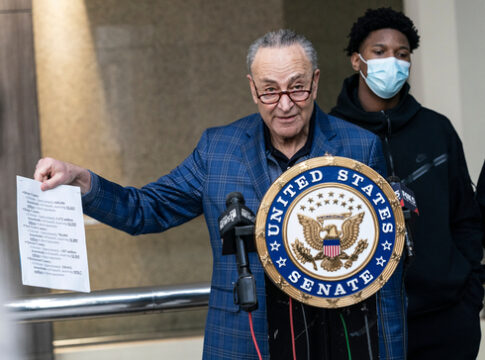Senate Majority Leader Chuck Schumer withdraws his support for controversial Biden judicial nominee Adeel Mangi in the face of strong opposition. Adeel Mangi’s nomination to the US Third Circuit Court of Appeals has been withdrawn. Schumer reaches an agreement with Republicans, sacrificing four appellate nominees. Law enforcement groups strongly opposed Mangi’s nomination.
Schumer Abandons Mangi Nomination Amid Controversy
In a surprising turn of events, Senate Majority Leader Chuck Schumer has withdrawn his support for Adeel Mangi, President Joe Biden’s nominee to the United States Third Circuit Court of Appeals. The decision was met with strong opposition from both Republicans and some Senate Democrats, emphasizing the contentious nature of judicial appointments in today’s political climate.
Schumer’s move is part of a larger deal reached with Republicans, which includes foregoing votes on Mangi and three other appellate court nominees in exchange for confirming a dozen Biden district court nominees. This agreement effectively ended Mangi’s chances of becoming the first Muslim federal appellate judge, which had added historical significance to his nomination.
NEW:
'Lacking the Votes': Chuck Schumer abandons embattled judicial nominee ADEEL MANGI, whom some Dems opposed over anti-police ties uncovered by @FreeBeacon.
Colossal blunder for White House, which could have pulled the nomination months ago. https://t.co/h8In4pEsCk
— Chuck Ross (@ChuckRossDC) November 22, 2024
Controversial Affiliations Spark Debate
Mangi’s nomination was heavily scrutinized due to his ties to organizations perceived to be anti-police and anti-Israel. Critics are concerned about his board position at the Rutgers Center for Security, Race, and Rights, which has been accused of anti-Israel rhetoric. Furthermore, his involvement with the Alliance of Families for Justice, which has supported convicted cop killers, proved particularly contentious.
“Mr. Mangi’s affiliation with the Alliance of Families for Justice is deeply concerning. My concern is with respect to the organization that supports individuals who kill police officers.” – Sen. Catherine Cortez Masto
These associations sparked outrage among law enforcement organizations, including the Pennsylvania Fraternal Order of Police. Critics argued that Mangi’s perceived support for organizations that justify Islamic terrorism and celebrate those who murder law enforcement officers disqualified him for a lifetime appointment to the federal bench.
It’s long past time for the Biden Administration to withdraw the nomination of Adeel Mangi. Law enforcement officers across the country have been sounding the alarm on Mr. Mangi’s radical affiliations. I’m glad that members of nation’s largest police union have decided to back…
— Leader McConnell (@LeaderMcConnell) March 28, 2024
Bipartisan Opposition Seals Mangi’s Fate
Mangi’s nomination was withdrawn due to more than just Republican opposition. Several Senate Democrats, including Catherine Cortez Masto, Jacky Rosen, and Joe Manchin, expressed concern about the nominee. This bipartisan skepticism ultimately led to Schumer’s decision to abandon the confirmation effort.
“Democrats have finally acknowledged the reality that Senator Graham has been talking about for months. Adeel Mangi is simply too radical to be confirmed to a lifetime seat on the bench.” – Emily Flower, a spokeswoman for Senate Judiciary Committee Republicans
The Schumer agreement affects not only Mangi, but also three other appellate nominees: Ryan Park (Fourth Circuit), Karla Campbell (Sixth Circuit), and Julia Lipez (First Circuit). This agreement clears the way for President-elect Donald Trump to fill these appellate court positions once he takes office, potentially shaping the federal judiciary for years to come.
Implications for Future Judicial Nominations
The controversy surrounding Mangi’s nomination and subsequent withdrawal highlight the difficulties confronting the Biden administration in its efforts to reshape the federal judiciary. The incident highlights how closely judicial nominees’ past affiliations and ideological leanings are scrutinized, especially in today’s polarized political environment.
As the dust settles on this contentious nomination process, there are still questions about the long-term impact on judicial appointments and the strategies both parties will use in future confirmation battles. The Mangi case is a stark reminder of the delicate balance between diversity in judicial appointments and the scrutiny of nominees’ backgrounds in an increasingly polarized political landscape.
Sources:
- Lacking the Votes’: Schumer Abandons Embattled Biden Judicial Nominee Adeel Mangi
- Radical Judicial Nominee Goes Down in Flames


